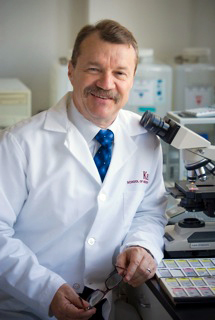By Amy E. Hamaker

Michael F. Press, the Harold E. Lee Chair in Cancer Research and professor of pathology at the Keck School of Medicine of USC, was recently supported by a grant from the Dr. Miriam and Sheldon G. Adelson Medical Research Foundation enabling him to collaborate with researchers from several other institutions on the genetics of ovarian cancer.
Courtesy Michael F. Press
Ovarian cancer frequently goes undiagnosed until it has spread, making it difficult to treat and often fatal. Research into genetic mechanisms of ovarian cancer at USC recently received a boost thanks to a grant of more than $300,000 from the Dr. Miriam and Sheldon G. Adelson Medical Research Foundation.
Michael F. Press, the Harold E. Lee Chair in Cancer Research at the USC Norris Comprehensive Cancer Center and professor of pathology at the Keck School of Medicine of USC, received $317,000 for the project “Potential Assays for Patient Selection to Ovarian Cancer Clinical Trials.” Press and his collaborators will continue their work into analyzing genomic alterations and determining how those alterations can be used to map specific treatments for individual patients.
Rather than funding single experiments, the foundation asks grant recipients to interact with peers at many institutions, a process that can often yield faster results for patients. Other project researchers working with Press include Dennis Slamon and Gottfried Konecny (Jonsson Cancer Center/UCLA); Joan Brugge (Harvard Medical School), Ronny Drapkin and George Demetri (Dana-Farber Cancer Institute); Victor Velculescu and Stephen Baylin (Johns Hopkins University); Gordon Mills (MD Anderson Cancer Center); and John Quackenbush (Dana-Farber Cancer Institute).
The long-term goal of the project is to analyze molecular changes in gene expression to discover which ones are likely to be critical to the survival of ovarian cancer cells, and identify drugs that target those specific expression changes. Once this is done, Press says, the researchers will be able to use early-phase clinical trials to evaluate the effectiveness of those drugs in women whose cancers show these genetic expressions.
“We’ve developed a clinical database in our lab related to the patients from whom we’ve collected ovarian cancer samples,” explained Press. “We’re planning to develop assays that are clinically relevant to identify patients who are potentially capable of benefitting from a particular type of therapy.
“It’s a very ambitious undertaking, and we think that the right people are assembled for this project,” he continued. “This grant is what allows the group to work together; we’ve previously been working with very minimal funding.”
The Dr. Miriam and Sheldon G. Adelson Medical Research Foundation, established in 2006, is a private foundation that supports collaborative approaches to biomedical innovation to prevent, reduce or eliminate disabling and life-threatening illness. Currently, the foundation is principally focusing its funding efforts on oncology, neurology and the biology of addictive diseases.

